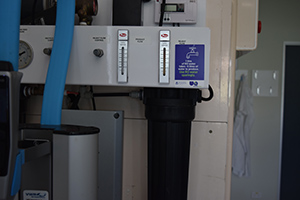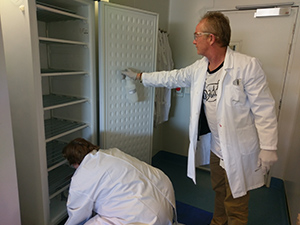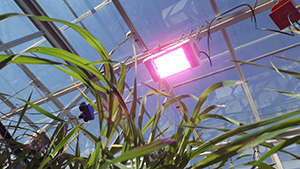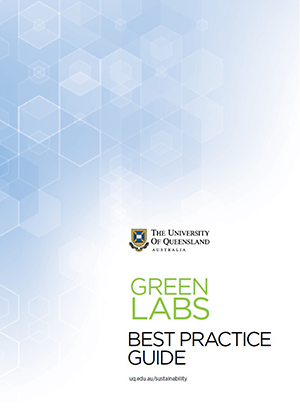Green Labs 2017 Initiatives and Activities
Reverse Osmosis Water Use Reduction

In 2017, the Green Labs Program encouraged lab staff to use reverse osmosis (RO) water sparingly by highlighting the high energy and water consumption required to produce RO water. With help from Green Labs representative Camila Orellana from the Australian Institute for Bioengineering and Nanotechnology, a sticker was developed displaying the message that one litre of RO water takes five litres of water to produce. Representatives were provided with these water-resistant stickers to place on their lab’s sink splashbacks next to RO water taps. This subtle reminder to lab staff when using RO water has ensured that they are now aware of the resource intensity of RO water, and that it should always be used sparingly.
Sustainability Week: Freezer Month

Given the potential for massive energy savings, the Green Labs Program once again ran the Freezer Month competition in August to coincide with Sustainability Week. Participants were required to undertake initiatives to reduce their freezers’ energy consumption—these included defrosting and cleaning ice and old samples out of freezers, ‘chilling up’ by raising an Ultra-Low Temperature (ULT) ‒80°C freezer to ‒70°C, switching off old freezers or upgrading to more energy-efficient models, sharing freezer space with other labs and setting up an inventory for their freezers to keep track of samples. By taking part in Freezer Month, representatives had the chance to win a great prize while reducing energy consumption in their labs.
The efforts of Suzanne O’Hagan and her lab from the Queensland Alliance for Environmental Health Sciences (QAEHS) in cleaning out and defrosting several freezers ensured that Suzanne’s lab took home the prize of an Oxfam fair trade gift pack of goodies for the whole team to enjoy.
Carrying out regular freezer maintenance can significantly reduce energy use, with the added bonus of a well-organised freezer and easy-to-locate samples. Discarding old samples that are no longer required can reduce the need for several ULT freezers, and make accessing in-use samples much simpler. The competition not only raised awareness of freezer energy use, but prompted labs to undertake regular freezer maintenance.
Energy Efficiency Project Fund

In late 2017, Green Labs representatives were invited to apply for the Energy Efficiency Project Fund to implement infrastructure upgrades and equipment purchases in their labs. Open to all UQ staff, this project fund gives labs the opportunity to reduce their energy use by giving them a grant to purchase more efficient equipment and upgrade their infrastructure.
In 2016, the Faculty of Science’s successful funding submission meant that it was able to replace the old 400 w high-pressure sodium vapour (HPS) lights in research facility glasshouses and darkrooms with state-of-the-art light-emitting diode (LED) grow lights. Once completed, this upgrade is estimated to save over 55,600 kWh and up to $8,000 per year, thanks to the longer life and reduced heat emissions of LED lights.
We eagerly await the outcomes of the 2017 Energy Efficiency Project Funding.
Green Labs Best Practice Guide
 Laboratory operation has many significant environmental effects, from energy and resource consumption to chemical and equipment use and disposal. In 2017, the Green Labs Best Practice Guide for more sustainable labs at UQ was developed with contributions from Green Labs representatives.
Laboratory operation has many significant environmental effects, from energy and resource consumption to chemical and equipment use and disposal. In 2017, the Green Labs Best Practice Guide for more sustainable labs at UQ was developed with contributions from Green Labs representatives.
The guide is a comprehensive reference guide for UQ lab staff, promoting positive behaviour change while ensuring that consistency is maintained across the University. The guide has five main focuses: energy, waste management, green chemistry, water use and procurement.
The Green Labs Best Practice Guide, along with additional information, is available on the Sustainability Office’s Resources webpage.
